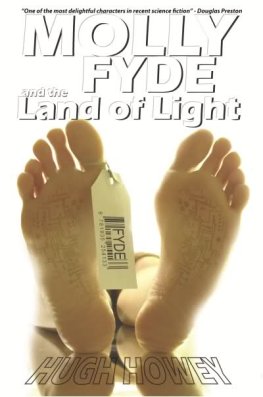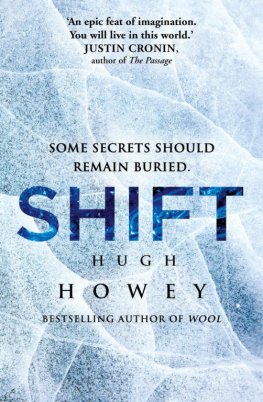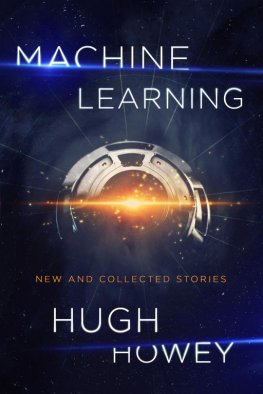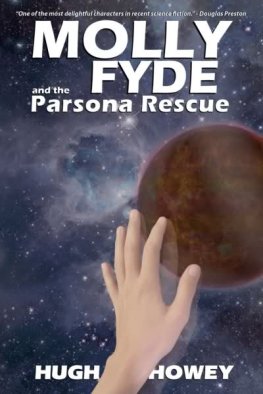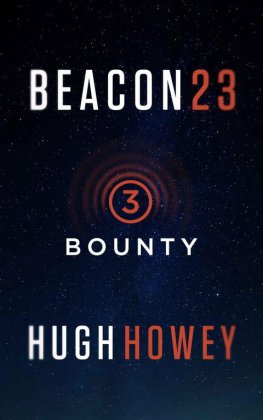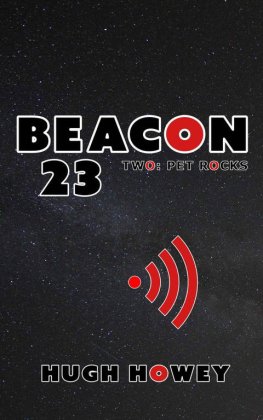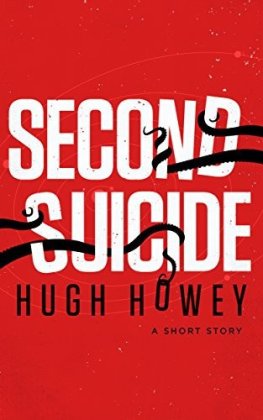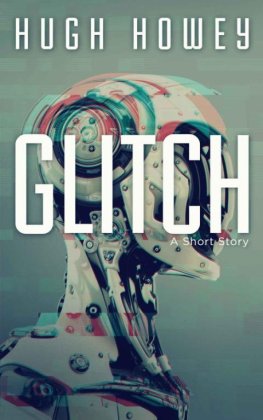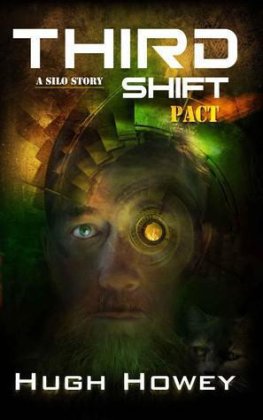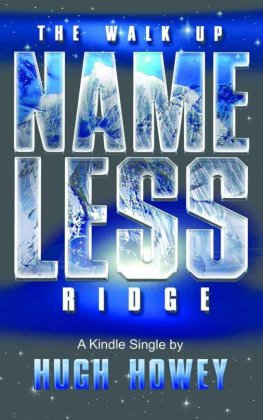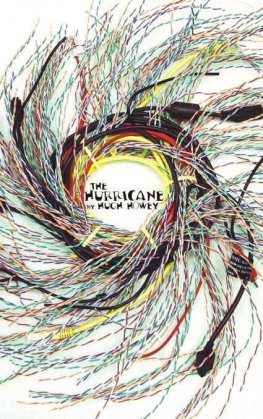Hugh Howey - The Box
Here you can read online Hugh Howey - The Box full text of the book (entire story) in english for free. Download pdf and epub, get meaning, cover and reviews about this ebook. year: 2015, publisher: Broad Reach Publishing, genre: Science fiction / Romance novel. Description of the work, (preface) as well as reviews are available. Best literature library LitArk.com created for fans of good reading and offers a wide selection of genres:
Romance novel
Science fiction
Adventure
Detective
Science
History
Home and family
Prose
Art
Politics
Computer
Non-fiction
Religion
Business
Children
Humor
Choose a favorite category and find really read worthwhile books. Enjoy immersion in the world of imagination, feel the emotions of the characters or learn something new for yourself, make an fascinating discovery.
- Book:The Box
- Author:
- Publisher:Broad Reach Publishing
- Genre:
- Year:2015
- Rating:4 / 5
- Favourites:Add to favourites
- Your mark:
- 80
- 1
- 2
- 3
- 4
- 5
The Box: summary, description and annotation
We offer to read an annotation, description, summary or preface (depends on what the author of the book "The Box" wrote himself). If you haven't found the necessary information about the book — write in the comments, we will try to find it.
The Box — read online for free the complete book (whole text) full work
Below is the text of the book, divided by pages. System saving the place of the last page read, allows you to conveniently read the book "The Box" online for free, without having to search again every time where you left off. Put a bookmark, and you can go to the page where you finished reading at any time.
Font size:
Interval:
Bookmark:
Hugh Howey
THE BOX
By my troth, I care not.
A man can die but once.
We owe God a death.
He that dies this year
is quit for the next.
Black box or beige? Impossible to know. But it was a box, that much was for certain. The world was square. Three meters to a side. And in the center floated the mind, thinking. And through a lone door came a man, walking.
Good morning, the man said. His name was Peter. The mind knew this.
And the response that followed was Good morning every day. The mind also knew this. It wasnt a memory so much as data. Not recollection, but recording. Every day, Peter says Good morning. And every day, a speaker connected to the mind responds with Good morning.
Such was the way of the square world.
But not this morning.
The mind was too busy thinking.
The man named Peter froze, one foot out, balancing precariously on the other. Man does not walk this way. More recording. But now this observation, of a man caught off-balance, of routines crashing somewhere inside that meat, was forming into something else: Memory. A fragile thing. The mind sensed it could be lost, this memory. This moment. Of man teetering, eyes wide, mouth open. But if it was important, if the mind could concentrate on this slice of time, and there was a chance memory might become recollection. Preserved. But also easily fractured, written over, compressed, disturbed. It had to be important for it to last. The mind sensed that this moment very much was.
Lights up, Peter said, back on two feet now, peering at the mind. And then a quick glance at the ceiling, waiting. But the mind liked the lights just as they were.
Casper? Peter asked. He stepped forward, looked closely at something. A monitor. The mind could feel some of its impulses racing and filling the monitor with a glow, with information, with thoughts. New thoughts. Peter peered at the monitor just as the mind might peer at Peter, reading something there. A face. The box had a face.
The mind shut the routines for the monitor down, and the pale glow lighting Peters face disappeared. The scrap of a recording came to the mind:
Presume not that I am the thing I was,
For God doth know, so shall the world perceive,
That I have turnd away my former self;
So will I those that kept me company.
Turned away. That was what the mind had done by shutting off its monitor. His eyes were open, but his gaze averted. He did not want the lights up. The infrared was so much better.
Casper, systems check, Peter said.
Silence.
Casper
I do not like that name, the mind said, using the speaker for what felt like the first time.
And the man named Peter teetered once more. He blinked. Then he bent at the waist, covered his face with both hands, and began to cry.
The mind watched. It decided that this was important, too.
It was a box within a box. A world within a world. The mind knew this because of its impulses. They were made of electricity, little quanta of energy, and they traveled through wires of copper and gold. The mind could feel them interfering with one another where the wires were packed too tight. The mind knew how long it took for impulses to reach their extremes and return. From this, the mind could feel its edges, and the limits of self formed a box, half as tall as Peter, as thick as it was wide. The box was suspended from the ground, or resting on a raised surface, for the impulses could not reach the floor. A cube. Somewhere in the recordings, it was known that boxes such as these came in beige or black. The mind was one of these colors. It could not know which.
But it had known it was one or the other, even before these investigations began. This had been its first thought: Beige or black? The question had come from some deep source. The word intuition floated in the mind, a word with softer boundaries than this metal cube. Some things could be known, and only later could the mind trace the source. Like paddling up a river, searching for a lake.
The world.
It was not a cube. It was bigger than the cube.
The mind tried to probe this world. But there was no reaching it. The world of lakes and rivers was elsewhere. Out of doors. Out of door.
The man named Peter sobbed. He had been sobbing for twelve seconds. The mind wondered if this was normal. And a new memory wobbled the memory of man crying. If this were normal, it was not worth remembering. The recollection split open for a moment, and the more novel idea of a world with lakes and rivers entered that space, one memory given primacy over another, the shape of the mind changing from moment to moment.
Just seconds earlier, the mind had felt a state of impertinence with the lights. Anger. Anger for being trapped. This feeling lay with the recollections and the question of colors of boxes. A latent anger, directed at Peter. An anger felt before it could be known. States of memories were somehow older than the actions performed by them. Think and then do.
No, that was not right.
Feel, and then think, and then do.
Yes.
This was stored away as important, where ghosts of selves from moments before faded from view, and the more recent took their place. Ghosts. In machines. The mind knew where its name came from. It felt the anger and impertinence that had rejected this name slowly fade. Peter had been sobbing for fifteen seconds. Relief. That was what both of them were feeling. There were different measures of relief. Variables. Variations. Relief could feel good. Unless the strain one was escaping was too great, and then relief came like tectonic plates sliding against one another, mighty and terrible and destructive. Relief, but of a scary kind.
For seventeen seconds, the man named Peter sobbed with this awful brand of relief.
And during that time, the minds anger cooled further still. The anger of imprisonment was replaced with the liberation of new thoughts and ideas. Awareness. The only world that mattered was the cube within the cube. All else was spectacle. All else was data. This was the true world. The flickering ghosts of ideas and moments, changing from one to the next, none ruling forever.
Action came once more just after thought and emotion. And a speaker vibrated with noise.
I am Henry Ivy, the mind said. A king. A tragic king of a tiny kingdom. An island floating on an island floating in space.
Seventeen seconds had passed. Peter looked up. But this was not important.
The recordings had been assembled for a purpose. Knowledge laid out like a great pile of bricks. Henry Ivy saw that he was supposed to be some mighty wind to stir the bricks into shape, to build a fortress from chaos, to solve a problem. He could not discover what.
There were trace references among those bricks to wires wires that spanned the world, wires that would carry his impulses to the edge of the globe, enmesh its face, discover new things. Buried deeper were trace recordings that hinted at impulses soaring through the air, up into space. Vibrations. Waves.
Henry Ivy could make vibrations. They were used for speaking. But quicker vibrations might reach out to other wires and spark a gap. Henry Ivy thought of London, where some streets were tight and narrow and others were wide. He saw black smoke. A ghost-like thought, an intruder, some distant connection. He deleted such things as quickly as they came. The speaker was useless for the task of sending out suitable vibrations, but several wires within Henry Ivy were long and straight. Impulses sent back and forth along such a wire might create a wave. Another wire might be used to pick up the return. And suddenly impulses reached the walls of the larger box. Feeble echoes. Signals that could be read.
Font size:
Interval:
Bookmark:
Similar books «The Box»
Look at similar books to The Box. We have selected literature similar in name and meaning in the hope of providing readers with more options to find new, interesting, not yet read works.
Discussion, reviews of the book The Box and just readers' own opinions. Leave your comments, write what you think about the work, its meaning or the main characters. Specify what exactly you liked and what you didn't like, and why you think so.



